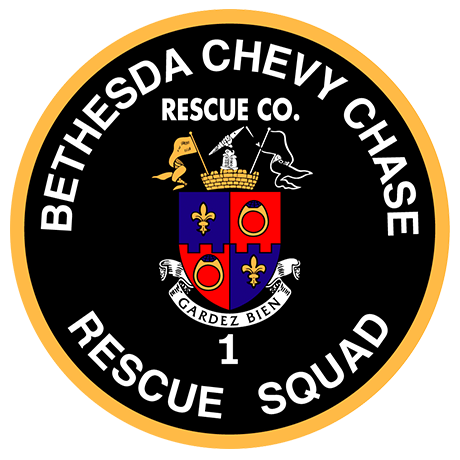Successful delivery of fire and rescue services demands highly skilled team members capable of operating effectively on a wide range of challenging incidents. To ensure exceptional service to our community and to comply with local, state and national regulations and best practices, the Bethesda-Chevy Chase Rescue Squad requires extensive education and training for all our operational personnel.
 For new volunteers, the training process is intense, beginning with an orientation program at our headquarters station focusing on department policies and safety, as well as several online modules focusing on radios, computer systems, and other equipment. Next, every volunteer who is not already certified as an emergency medical technician takes an EMT class at the Montgomery County Public Safety Training Academy. During this 160-hour course, volunteers are also participating in training drills during their weekly shifts at the station, preparing themselves to be the lead EMTs on emergency calls and during transports in the ambulance.
For new volunteers, the training process is intense, beginning with an orientation program at our headquarters station focusing on department policies and safety, as well as several online modules focusing on radios, computer systems, and other equipment. Next, every volunteer who is not already certified as an emergency medical technician takes an EMT class at the Montgomery County Public Safety Training Academy. During this 160-hour course, volunteers are also participating in training drills during their weekly shifts at the station, preparing themselves to be the lead EMTs on emergency calls and during transports in the ambulance.
All new EMTs must become nationally certified by the National Registry of EMTs, licensed by the Maryland Institute for EMS Systems, and approved by our chief to practice. Once volunteers complete this rigorous process, many go on to receive additional education and training, taking intense courses in emergency vehicle operation, firefighting or other specialty areas.
An inexperienced new member working to become a firefighter must complete many months of training and apprenticeship, including basic firefighting courses, before being allowed to operate in full capacity. Senior members hold advanced training certification to serve as unit officers (the supervisor of the crew) and as rescue squad drivers and operators. Advanced training includes vehicle and machinery rescue, water pumps and hydraulics, aerial ladder operations, fire strategy and tactics and fire officer development training.
Some members of the rescue squad choose to further their medical training by becoming paramedics. Paramedics receive hundreds of hours of additional education, in both the classroom and in clinical settings, including the emergency department, trauma center, mental health facility and labor and delivery department.
In addition to the required training to earn certifications, BCCRS members also participate in daily drills to maintain their skills and continually learn new ways to help members of our community in need.
To learn more about becoming a volunteer, click here.
